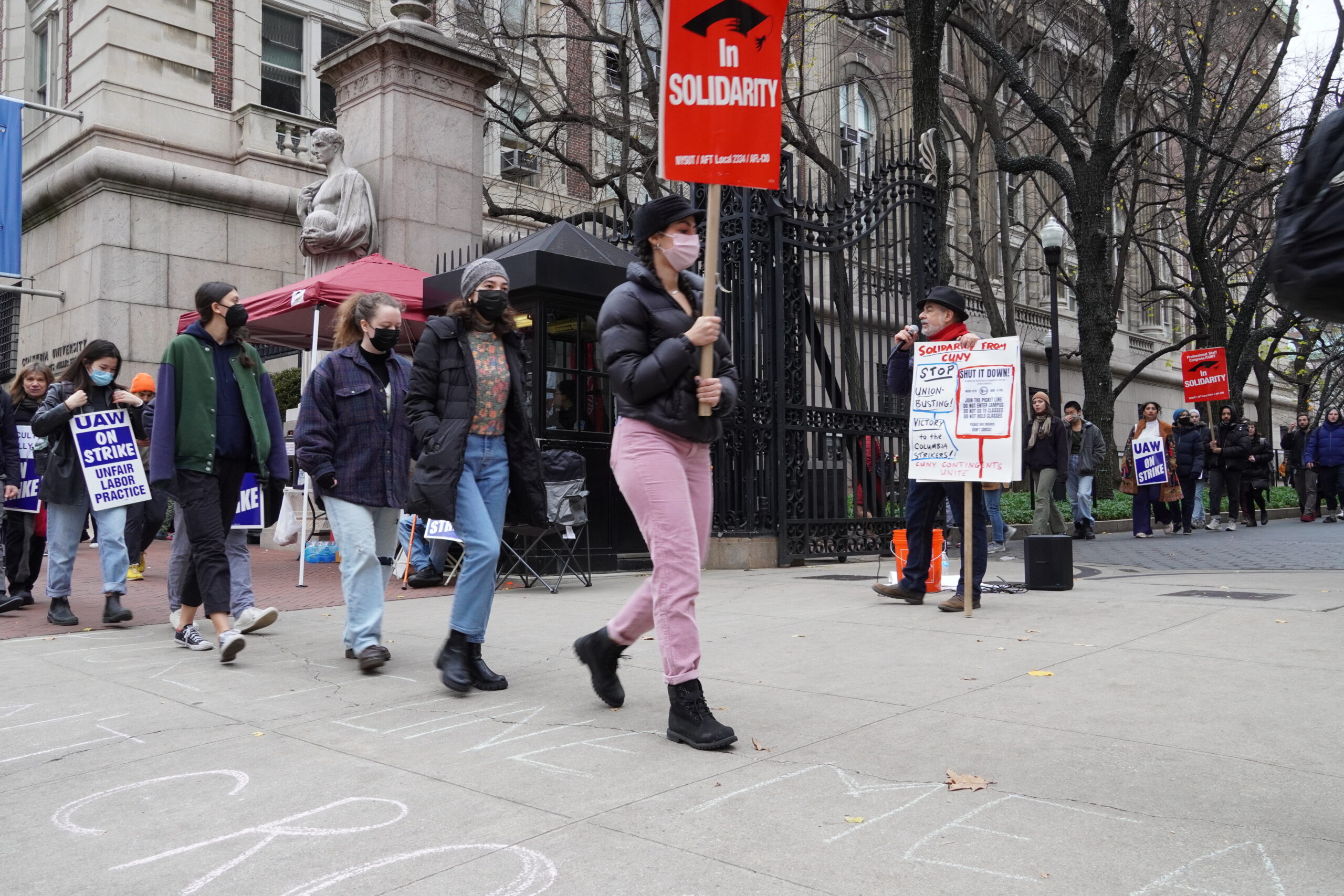Striking Columbia University student workers formed a picket line in front of their campus on Wednesday, Dec. 8, urging students not to enter campus. Workers blocked entrances around the university as they entered their sixth week on strike, hoping to secure a living wage, protections against discrimination, and enhanced healthcare benefits.
The protest was ignited after Columbia University Vice President of Human Resources Daniel Driscoll sent out an email to student employees claiming striking workers may be replaced if they did not return to work by Dec. 10. The strike comes two and a half years into bargaining conflicts between the student union and university, and at a time when the union — SWC-UAW 2110 — seeks to be recognized by the university.
A “union” refers to a group of workers within a workplace who come together to protect their rights and common interests.
Numerous unions from across New York City were present at the picket line supporting Columbia student workers including ACT-UAW Local 9702 — the union that represents New School part-time faculty, health workers, and student workers as well as NYU adjunct professors.
Parsons professor Alexander Robins represented ACT-UAW Local 9702 on the picket line. Robins noted that the fight of Columbia student workers mirrors that of many workers across academia.
“Universities have been having their cake and eating it, too,” Robins, an executive board member of ACT-UAW 7902, said. “They’ve been running themselves like for-profit universities, but under the mantle of being not-for-profit.”
Robins, who took part in the picket line, said the mood was one of camaraderie and solidarity.
“There was good turnout and also good turnout from fellow unions from across the city,” he said. “I saw comrades from the New Yorker union, I saw leadership from the union that represents [adjuncts at] CUNY. … It was a really good vibe and passersby were in high spirits. … I hope that is the type of energy that just carries them forward.”
SWC-UAW 2110 bargaining committee member Mandi Spishak-Thomas, a fourth-year PhD candidate at the Columbia School of Social Work, said the university pays workers an unlivable wage.
Spishak-Thomas said Columbia University “President [Lee C.] Bollinger is one of the few presidents across the Ivy League institutions that didn’t take a pay-cut during COVID, but he is instead keeping us $10,000 to $18,000 … below the living wage.”
Columbia’s endowment grew by $3.1 billion in FY 2021, but, Spishak-Thomas contended, rather than supporting workers, the university has left them feeling unsupported throughout the pandemic.
“The university is also not offering us a raise, [while] they usually give us a 3% raise,” Spishak-Thomas said. “This has been a really, really hard two years for a lot of people and instead of bolstering support for student workers, we’re seeing the university cut back even more.”
Columbia student workers are one of many student unions across the country who’ve gone on strike in recent years: At NYU and Harvard, graduate student unions went on strike earlier this year, resulting in new bargaining contracts. The New School’s student workers union went on strike in 2018, resulting in a contract that runs through 2023.
The New School’s part-time faculty union, which Robins is a member of, will soon enter negotiations with the college, he noted.
“We are heading up to contract negotiations for the part-time faculty and the same kind of profit-driven logic that is leading the Columbia graduate students to strike is the same kind of logic that the New School administration participates in, which is maximizing profit over people,” Robins said. “Then decreasing revenue as much as possible, including reasonable wages, fair compensation and good benefits, not just for graduate students, but for part time faculty as well.”
The fight of Columbia workers represents one for all workers looking to secure a living wage, Spishak-Thomas said.
“This fight is worth it, and it’s bigger than all of us,” Spishak-Thomas said. “I’m going to graduate and I’m probably not going to reap the benefits of many of the things that we’re fighting for … but I can really understand that the first years in my department [and] the second years, it’s worth it for them to have something better than we’ve had.”







